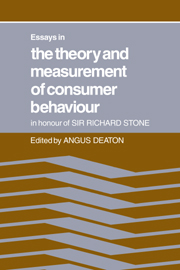Book contents
- Frontmatter
- Contents
- Foreword
- List of contributors
- Part one The analysis of commodity demands
- Introduction
- 1 Some Engel curves
- 2 Suggestions towards freeing systems of demand functions from a strait-jacket
- 3 Theoretical and empirical approaches to consumer demand under rationing
- 4 The independence transformation: a review and some further explorations
- 5 The analysis of consumption and demand in the USSR
- Part two The theory of index numbers
- Part three The consumption function and durable goods
- Part four Other aspects: fertility and labour supply
- Bibliography of Sir Richard Stone's works 1936–79
- Index of names
- Subject index
2 - Suggestions towards freeing systems of demand functions from a strait-jacket
Published online by Cambridge University Press: 05 November 2011
- Frontmatter
- Contents
- Foreword
- List of contributors
- Part one The analysis of commodity demands
- Introduction
- 1 Some Engel curves
- 2 Suggestions towards freeing systems of demand functions from a strait-jacket
- 3 Theoretical and empirical approaches to consumer demand under rationing
- 4 The independence transformation: a review and some further explorations
- 5 The analysis of consumption and demand in the USSR
- Part two The theory of index numbers
- Part three The consumption function and durable goods
- Part four Other aspects: fertility and labour supply
- Bibliography of Sir Richard Stone's works 1936–79
- Index of names
- Subject index
Summary
Introduction
The development of complete systems of demand functions has been one of the most important trends in research on consumer demand in the last couple of decades. Richard Stone's Linear Expenditure System and the theoretical approach which he used in establishing this system have been instrumental in this development. The LES system has been widely used both in its original form and in forms modified and generalized in various directions. Several other systems have also appeared. There is no doubt that great advances have been achieved. It seems to me, however, that research in this field has, voluntarily, put on a strait-jacket. I have in mind the requirement that all demand functions constituting the system shall be ‘of the same form’, differing only in the values of the parameters. The purpose of the present paper is to suggest approaches which may help to free theory and applied work from this strait-jacket.
The idea that it would be sound and useful to abandon the requirement that all functions in the system should be of the same form is not entirely uncontroversial. L. J. Lau has argued that such uniformity ‘is desirable because it allows all commodities to be treated symmetrically’. This kind of symmetry does of course possess a sort of aesthetic value, and it is also convenient from a mathematical and computational point of view.
- Type
- Chapter
- Information
- Essays in the Theory and Measurement of Consumer Behaviour: In Honour of Sir Richard Stone , pp. 31 - 54Publisher: Cambridge University PressPrint publication year: 1981
- 1
- Cited by



